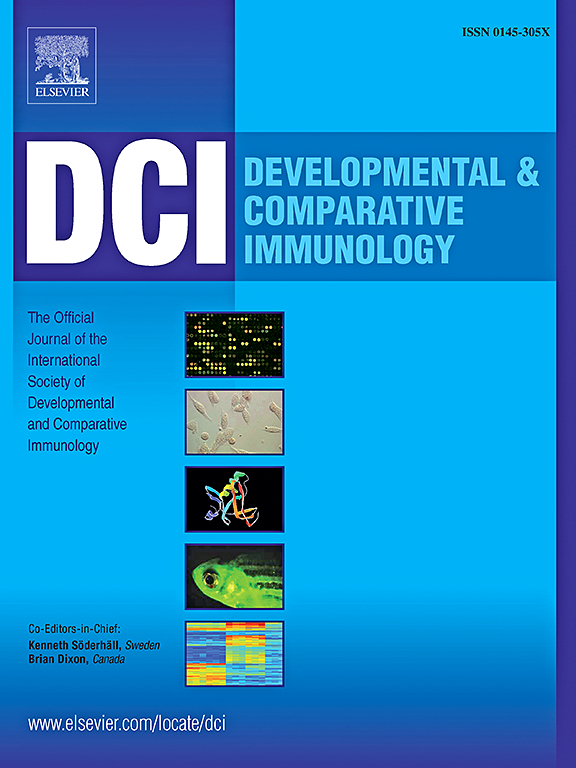Analysis of the potential long-lasting effects of probiotic Debaryomyces hansenii CBS 8339 on trained immunity in newborn goats
IF 2.7
3区 农林科学
Q1 FISHERIES
引用次数: 0
Abstract
Trained immunity has been described as the memory capacity of the innate immune system. Several microbial components have been shown to induce trained immunity. Research on the potential of probiotics to trigger these effects has been limited to a few in vitro studies but remains completely unknown in vivo. Components from the probiotic Debaryomyces hansenii CBS 8339 (Dh) have been shown to induce innate immune memory in goat kids and calves. In the present study, stimulating innate immune cells from newborn goats with probiotic Dh increased respiratory burst activity and nitric oxide production, while cell phagocytosis was unaffected. Glucose uptake was enhanced in goat's cells stimulated with Dh, but lactate production was decreased. In newborn goats, after the training scheme (via oral probiotic administration), cell phagocytosis, nitric oxide production and glycolysis — through the upregulation of AKT and HIF1A gene expression, glucose consumption and lactate production— were enhanced. The expression of IL1B gene was similar between the D. hansenii and control groups. Moreover, the potential long-lasting effects were assessed 30 days after initiation of the training scheme. Cell phagocytosis, respiratory burst and myeloperoxidase activity were enhanced, while glycolytic parameters remained unaffected. Altogether, the results of the present study suggest that the immune training scheme may induce trained immunity by the probiotic D. hansenii in newborn goats. However, our findings were not conclusive regarding the long-lasting (one-month) effects of trained immunity by probiotics.
分析益生菌 Debaryomyces hansenii CBS 8339 对新生山羊训练有素的免疫力的潜在长期影响。
训练免疫被描述为先天免疫系统的记忆能力。一些微生物成分已被证明能诱导训练有素的免疫力。关于益生菌触发这些效应的潜力的研究仅限于一些体外研究,但对体内的研究仍完全未知。益生菌德巴氏酵母菌(Debaryomyces hansenii)CBS 8339(Dh)中的成分已被证明能诱导山羊幼崽和小牛的先天免疫记忆。在本研究中,用益生菌 Dh 刺激新生山羊的先天性免疫细胞可增加呼吸爆发活动和一氧化氮的产生,而细胞吞噬功能不受影响。受 Dh 刺激的山羊细胞对葡萄糖的吸收增强,但乳酸盐的产生减少。通过口服益生菌)训练计划后,新生山羊的细胞吞噬、一氧化氮产生和糖酵解(通过上调 AKT 和 HIF1A 基因表达、葡萄糖消耗和乳酸盐产生)均得到增强。D. hansenii组和对照组的IL1B基因表达相似。此外,在训练计划开始 30 天后,还对潜在的持久效果进行了评估。细胞吞噬功能、呼吸爆发和髓过氧化物酶活性得到了增强,而糖酵解参数未受影响。总之,本研究的结果表明,免疫训练计划可通过益生菌 D. hansenii 诱导新生山羊产生训练有素的免疫力。然而,我们的研究结果并不能确定益生菌训练免疫的效果是否持久(一个月)。
本文章由计算机程序翻译,如有差异,请以英文原文为准。
求助全文
约1分钟内获得全文
求助全文
来源期刊
CiteScore
6.20
自引率
6.90%
发文量
206
审稿时长
49 days
期刊介绍:
Developmental and Comparative Immunology (DCI) is an international journal that publishes articles describing original research in all areas of immunology, including comparative aspects of immunity and the evolution and development of the immune system. Manuscripts describing studies of immune systems in both vertebrates and invertebrates are welcome. All levels of immunological investigations are appropriate: organismal, cellular, biochemical and molecular genetics, extending to such fields as aging of the immune system, interaction between the immune and neuroendocrine system and intestinal immunity.

 求助内容:
求助内容: 应助结果提醒方式:
应助结果提醒方式:


